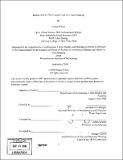Bolshevik era, the extreme case of urban planning
Author(s)
Nilina, Nadya
DownloadFull printable version (15.01Mb)
Other Contributors
Massachusetts Institute of Technology. Dept. of Urban Studies and Planning.
Advisor
Alexander D'Hooghe.
Terms of use
Metadata
Show full item recordAbstract
The key premise of the Russian revolutionary movement was the overthrow of the old government and establishment of the new political order under the one party leadership of the Bolsheviks. The political platform of the new government extended well beyond the promise of simple reforms. Its foundation was a vision of an entirely new society governed by a set of new economic mechanisms and social relations. The foundation of the new system rested on the complete socialization of all economic resources and means of production and the creation of the centralized planning system independent of the volatile dynamics of the free market. In this thesis I argue that in their role as the new government of Russia, Bolsheviks simultaneously acted as town planners and as social planners, envisioning the new society and its institutions in every detail and creating a new urban form-the socialist city, and the new citizen-the socialist man. To create this city the Bolsheviks designed a unique tool-they merged their legal right to make policy with their ability to use rhetoric in the form of widespread persuasion, propaganda, indoctrination and force. I define the socialist city as an urban settlement in which the primary from of human existence is the collective life. (cont.) This city is designed in such a way as to make every space accessible to government control, by making it transparent to the collective which has assumed the censoring and policing functions of the government The space of the city is permeated by a network of institutions and agents making it an environment in which a person is constantly exposed to the mechanisms of control. During the first decade after the revolution the Bolsheviks created the forms of housing and the auxiliary institutions, such as the social club, the communal canteen etc, that became the building blocks of the socialist city. In this thesis I examine the social institutions created by the Bolsheviks between 1917 and 1932 with the goal of understanding of how their design defined the future development of the socialist city.
Description
Thesis (S.M.)--Massachusetts Institute of Technology, Dept. of Architecture; and, (M.C.P.)--Massachusetts Institute of Technology, Dept. of Urban Studies and Planning, 2006. Leaf 102 blank. Includes bibliographical references (leaves 99-101).
Date issued
2006Department
Massachusetts Institute of Technology. Department of Architecture; Massachusetts Institute of Technology. Department of Urban Studies and PlanningPublisher
Massachusetts Institute of Technology
Keywords
Architecture., Urban Studies and Planning.